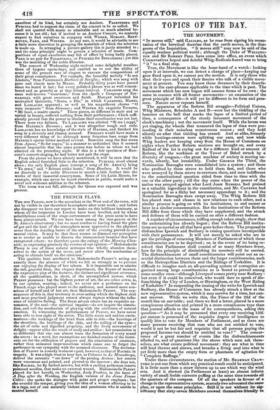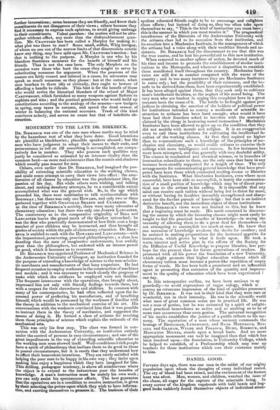TOPICS OF THE DAY.
THE MOVEMENT.
" IT moves StIll," said GALILEO, as he rose from signing his recan- tation of the heretical doctrine that the earth moves, in the dun- geons of the Inquisition. " It moves still" may now be said of the equally restless political world ; although the Duke of WELLING TON and Sir ROBERT PEEL have come into office, an event which Conservatives hoped and doleful Whig-Radicals feared was to bring " it" to a final stop.
True, the Movement is like the hour-hand of a watch : looking upon it at intervals, we can detect a change of place—keeping our gaze fixed upon it, we cannot see the motion. It is only those who shut their eyes and speak their fancies who talk of a visible move- ment at present. You may know these dreamers by their describ- ing it in the cast-phrases applicable to the time which is past. The movement which has now begun will assume forms of its own : the same in essence with all former movements— an emanation of the great principle of life—it will yet be different in its form and pres- sure. Nature never repeats herself.
The apparatus of the Reform Bill struggle—Political Unions, Whig Ministers, Schedules A and B—were but the tinkling of the hammer on the bell that marks the lapse of a limited period of time, a consequence of the steady incessant movement of the clock's machinery ; not the movement itself. While the Iarum was yet ringing, the wheels that measured the lapse of time were pro- ceeding in their noiseless monotonous course ; and they hold silently on after that tinkling has ceased. And so alike, formerly while hustings-orators were splitting our ears, and now while Whig leaders are keeping away from the House of Commons on nights when Further Reform motions are brought on and every Radical of the lot is crying out for a different kind or amount of Reform, like the workmen at the Tower of Babel struck by a diversity of tongues,--the great machine of society is moving on- wards, silently, but irresistibly. Under GEORGE the Third, the Nomination Boroughs were consolidated into a system ; and those who profited by them strove to hold them fast, and those who were annoyed by them strove to overturn them, and men indifferent to the constitutional question sided from time to time with the one or the other party ; till the day came when the power of the nation was arrayed against what Lord Jonrt RUSSELL had praised as a valuable ingredient in the constitution, and Mr. CANNING had apologized for as a filthy but necessary appendage to it ; and the Nomination Boroughs were swept away. The Whig Reform Bill has placed men and classes in new relations to each other, and a similar process is going on with its institutions, to end sooner or later in a similar consummation. But the institutions of the Reform Bill differ from those which they have supplanted, and the attack and defence of them will be carried on after a different fashion.
A number of circumstances, trifling enough taken singly, show that the undermining has already begun ; that the Reform Bill institu- tions are as mortal as all that have gone before them. The proposal to disfranchise Ipswich and Sudbury is raising questions incompatible with their permanence. It will not merely be asked who are to get the privilege of returning Members of Parliament of which these constituencies are to be deprived ; or, in the event of its being re- solved that Parliament shall consist of so many Members fewer, how far the principle of diminishing its numbers will be carried. The disfranchisement of small constituencies will point out an es- sential distinction between them and the larger constituencies, such as the Metropolitan Districts and the Ridings of Yorkshire. It is difficult to imagine such an all-pervading system of corruption or- ganized among large constituencies as is found to prevail among some smaller ones—although Liverpool comes pretty near Sudbury : but even if it could be conceived, who would dare to speak of dis- franchising the City of London, or Birmingham, or the West Riding of Yorkshire ? In suspending the issuing of the writs for Ipswich and Sudbury, the House of Commons has already struck a blow at the new representative system, which it may survive for a time, but can-
not recover. While we write this, the Times of the 22d of the month lies on our table ; and there we find a letter, placed in a more conspicuous situation and printed in a more conspicuous type than
that journal affords to the mass of its correspondents, asking this question—" As it may be presumed that every one receiving 150/.
per annum is possessed of the requisite degree of intelligence to qualify him to vote for Members of Parliament, and as there are many persons receiving that sum who are not entitled to vote, would it not be but fair and requisite that all persons paying the proposed Income-tax should be entitled to vote ? " The concur- rence of a great number of events like the disfranchisements alluded to, and of questions like the above which men ask them- selves, are what create political movement : they are what in time will lend thewes and sinews, and breathe a living soul into what is yet little more than the empty form or phantasm of agitation for "Complete Suffrage."
Under these circumstances, the motion of Mr. SHARMAN CRAW.. FORD is not one from which any practical result could be anticipated. It is little more than a straw thrown up to see which way the wind
sets. And it showed (in Parliament at least) an almost infinite variety of small feeble currents puffing at the same time towards all
the quarters of the compass. Of all the speakers in favour of a change in the representative system, scarcely two advocated the same plan, or upon the same principles. Still it is not without its sig- nificancy that sixty-seven Members avowed themselves friendly to further innovations; some because they are friendly, and know their constituents do not disapprove of their views; others because they find it necessary to express such opinions, to avoid giving umbrage to their constituents. Valeat quantum: the motion will not be alto- gether without effect, any more than the disfranchisement ques- tion. Mr. CRAWFORD has been called a Marplot for making it : what plot was there to mar? Some small, selfish, Whig intngue, of whom no one out of the narrow limits of that disconsolate coterie knew any thing, may have split upon Mr. CRAWFOR.D'S motion : but that is nothing to the purpose. A Marplot is one who by his blunders frustrates measures for the benefit of himself and his friends. That is not the case here. The only Marplots on the occasion were those who hurt the cause they sought to serve by substituting nonsense for argument. When the passions of the masses are fairly roused and inlisted in a cause, its advocates may speak as much nonsense as they please : but at the outset, when men hearken to them idly or critically, they ought to beware of affording a handle to ridicule. This hint is for the benefit of those who would revive the historical blunders of the school of Major CARTWRIGHT, which furnished so many weapons against Reform to sophists and wits ; and the poetical gentlemen who would build up constitutions according to the analogy of the seasons—sow budgets in spring, reap taxes in autumn, and spend the dead season of winter in balancing the national accounts. Trash of this kind convinces nobody, and serves no cause but that of indefinite oh,- strnction.



























 Previous page
Previous page